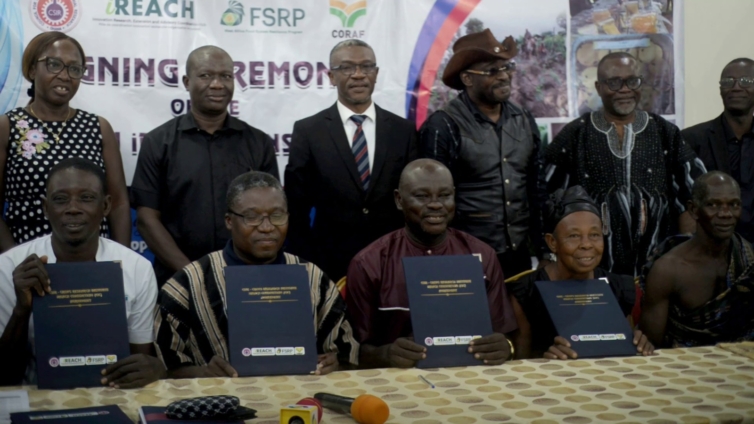The Crops Research Institute of the Council for Scientific and Industrial Research (CSIR-CRI) has formalized its partnership with private farming enterprises to facilitate the projection of indigenous agricultural technologies for farmers’ adoption.
Under its Innovative Research and Extension Advisory Coordination Hub (iREACH), the collaboration would facilitate access to the CRI-improved crop varieties and agricultural technologies by farmers to ensure food security.
Ghana’s agricultural sector, despite being the backbone of the economy, is fraught with numerous challenges spanning accessibility to modernized farming practices and financial assistance.

These challenges impact the productivity of the local sector to keep up with the market demand.
The agreement is to ensure enhanced food security, job creation, youth development and improved livelihood through affordable and accessible technologies.
“As the DG of CSIR, I will ensure its sustainability to become the main vehicle for making CSIR technologies readily accessible and affordable. We have the required technologies for this great transformation and are committed to work with government and development partners to achieve the Ghana that we all desire,” Director General of the CSIR, Prof. Paul Boso said.
The Innovation Research Extension Advisory Coordination Hub (iREACH) is being promoted by the West and Central African Council for Agricultural Research and Development (CORAF).
The project which started in 2022 affords farmers, agric scientists, and interested entities the opportunity to adopt technologies relevant to their fields of crop and food production.
“Farmers in West and Central Africa continue to use old technologies that are not performing. But there are a lot of technologies including improved seed varieties, small farming technologies conducted at the CSIR which need to be accessible to the farmers to increase their productivity and gains,” Technical Manager at CORAF iREACH, Dr. Caroline Makamto Sobgui said.

Project Coordinator, Prof. Emmanuel Otoo, explains the need to protect indigenous food systems for food security.
“Imagine prices of food have hiked. There is also disruption in the supply of food systems. Can we survive during such times? There’s the need to pay attention to our food systems now than we are doing,” he said.
The CSIR-CRI iREACH consortium, comprises eight organisations with the CSIR-Crops Research Institute as the lead institution and seven large-scale farm enterprises within Ashanti, Bono and Bono East regions.
Some partners shared the potential gains from participating in the project.
“This is really going to help us access loans and other assistances like technologies to improve the agriculture sector,” one of the partners, Yussif Bombaz said.
The project is in partnership with the USAID through Kansa State University and the World Bank through its Food Systems Resilience Project.
Latest Stories
-
I want to focus more on my education – Chidimma Adetshina quits pageantry
3 hours -
Priest replaced after Sabrina Carpenter shoots music video in his church
4 hours -
Duct-taped banana artwork sells for $6.2m in NYC
4 hours -
Arrest warrants issued for Netanyahu, Gallant and Hamas commander over alleged war crimes
4 hours -
Actors Jonathan Majors and Meagan Good are engaged
4 hours -
Expired rice saga: A ‘best before date’ can be extended – Food and Agriculture Engineer
4 hours -
Why I rejected Range Rover gift from a man – Tiwa Savage
4 hours -
KNUST Engineering College honours Telecel Ghana CEO at Alumni Excellence Awards
5 hours -
Postecoglou backs Bentancur appeal after ‘mistake’
5 hours -
#Manifesto debate: NDC to enact and pass National Climate Law – Prof Klutse
5 hours -
‘Everything a manager could wish for’ – Guardiola signs new deal
5 hours -
TEWU suspends strike after NLC directive, urges swift resolution of grievances
5 hours -
Netflix debuts Grain Media’s explosive film
6 hours -
‘Expired’ rice scandal: FDA is complicit; top officials must be fired – Ablakwa
6 hours -
#TheManifestoDebate: We’ll provide potable water, expand water distribution network – NDC
7 hours

